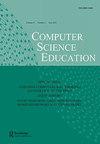埃塞俄比亚中学ICT课程中的计算思维
IF 2.2
Q1 EDUCATION & EDUCATIONAL RESEARCH
引用次数: 1
摘要
背景与语境计算思维(CT)是21世纪毕业生加入职场所需的技能之一。因此,各国已开始将CT纳入其课程。目标然而,缺乏来自非洲的研究表明CT在科学、技术、工程和数学(STEM)课程中的整合程度。本研究的主要目的是评估CT在多大程度上被纳入埃塞俄比亚中学(9-12年级)的信息和通信技术(ICT)课程。方法教学大纲、教科书和教学指南中描述的埃塞俄比亚中学信息和通信技术课程是本研究的数据来源。然后在Atlas.ti环境中对数据进行定性专题分析。调查结果尽管强调信息和通信技术素养,但分析显示,CT是通过使用Logo、Excel和多媒体项目纳入课程的。然而,这种一体化不能说是“系统性的”。影响该研究可以为从业者和决策者提供证据,为计划将CT纳入ESS ICT课程制定路径。从K-12到高等教育水平的类似研究也可以从这项研究中受益。本文章由计算机程序翻译,如有差异,请以英文原文为准。
Computational thinking in the Ethiopian secondary school ICT curriculum
ABSTRACT Background and Context Computational thinking (CT) is one of the 21st century skills required of graduates joining the workforce. Hence, countries have begun to incorporate CT into their curricula. Objective There is, however, a dearth of research coming from Africa showing the extent of CT’s integration in the science, technology, engineering, and mathematics (STEM) curriculum. The main objective of this study was to assess the extent to which CT was integrated into Ethiopia’s secondary school (Grades 9–12) information and communication technology (ICT) curriculum. Method The Ethiopian secondary school (ESS) ICT curriculum, as portrayed in the syllabi, textbooks, and teaching guides, served as the data source for the study. The data were then subjected to qualitative thematic analysis in the Atlas.ti environment. Findings Despite the emphasis on ICT literacy, the analysis revealed that CT was incorporated into the curriculum through the use of Logo, Excel, and multimedia projects. The integration could not however be described as “systematic”. Implications The research could provide practitioners and policymakers with evidence to chart a path for the planned integration of CT into the ESS ICT curriculum. Similar studies from K-12 to higher education levels could also benefit from the research.
求助全文
通过发布文献求助,成功后即可免费获取论文全文。
去求助
来源期刊

Computer Science Education
EDUCATION & EDUCATIONAL RESEARCH-
CiteScore
6.90
自引率
3.70%
发文量
23
期刊介绍:
Computer Science Education publishes high-quality papers with a specific focus on teaching and learning within the computing discipline. The journal seeks novel contributions that are accessible and of interest to researchers and practitioners alike. We invite work with learners of all ages and across both classroom and out-of-classroom learning contexts.
 求助内容:
求助内容: 应助结果提醒方式:
应助结果提醒方式:


